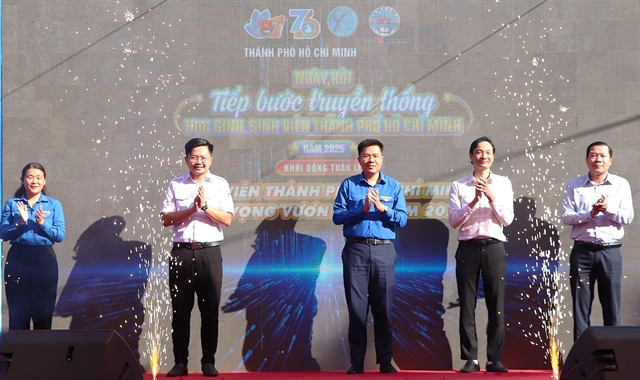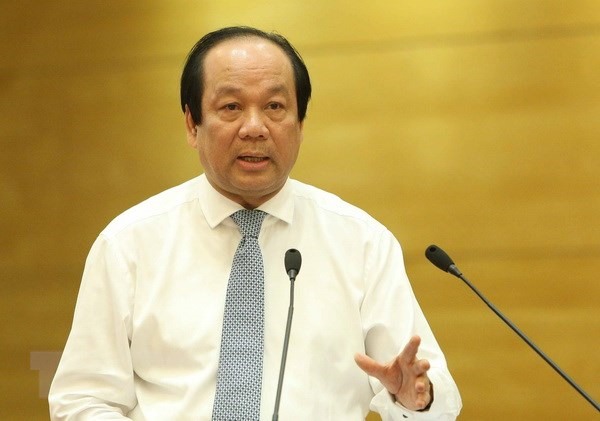 Opinion
Opinion

The reform of administrative procedures must be a "non-stop resolve", that’s the message from Minister, Chairman of the Government Office Mai Tiến Dũng who spoke to Vietnam News Agency about challenges facing administrative reforms over the past three years.
 |
| Minister, Chairman of the Government Office Mai Tiến Dũng. — VNA/VNS Photo Dương Giang |
The reform of administrative procedures must be a "non-stop resolve", that’s the message from Minister, Chairman of the Government Office Mai Tiến Dũng who spoke to Vietnam News Agency about challenges facing administrative reforms over the past three years.
Working side by side with the Prime Minister in various activities, have you ever felt overloaded and been under pressure?
It’s lie to say no hard work, no pressure. But it’s important to stay devoted and loyal. The whole Government Office staff thoroughly grasps such thoughts to be open, willing to learn, listen, and to be determined to follow the Prime Minister’s guiding ideology that the Government should transform from administrative management to serving, which means the Government must be proactive in all works. Human beings play the most significant role in all reforms.
Not only me, but all ministers have to work under pressure. With the Prime Minister’s strong direction, enthusiasm, fierceness and determination, it is impossible for ministers and heads of sectors to stand on the outside.
Pressure also comes from higher requirements for professional qualifications, skills and wills. Upon the Prime Minister’s demands, the Government Office has always reformed itself towards modernity and professionalism.
Did you ever feel discouraged with various layers of reforms?
No, because those [reforms] are what the society, enterprises and people really need. But it’s actually hard to do. Recently, we worked to cut down 6,776 out of 9,926 procedures required for specialised checks for export and import goods, exceeding 36,5 per cent of the target set by the Resolution No 19 [now Resolution No 2/NQ-CP]. This saved 11.6 million working days, equivalent to more than VNĐ5.4 trillion (US$233 million). We also removed 3,364 business conditions out of the total 6,191, saving more than 5.9 million working days or VNĐ889.5 billion annually. As such, we saved more than VNĐ6.3 trillion ($271 million).
Enterprises and the people need reforms but they must be practical and implemented drastically and continuously to remove obstacles and cut costs to facilitate enterprises to integrate into the commodity market. It’s a non-stop resolve, no matter how hard it is.
I visited some public administrative centres in certain localities, some did it really well, some did it just for fame as they announced that public administrative procedures had been upgraded to level 3 and level 4 categories but all dossiers/documents "had to go" back to relevant authorities and then it took days to be stamped and returned to the people. [According to the Government’s Decree 43/2011/NĐ-CP on launching online public services which defines four levels of public service registration, the applicant can fill in and submit the forms online (level 3), and service payments can be settled online. Transaction results are available either online or by post, on request (level 4)]. That’s not true and non-transparent.
That’s why reforms must be done seriously. In the future, a number of sections of the Government’s Advisory Council for Administrative Procedure Reform will be established. Concurrently, meetings with enterprises and enterprises’ associations are needed to find out any difficulties and obstacles that exist.
You once said officials working for administrative reforms must dare to face vested interests. How about you? Were you faced with vested interests?
Yes, I was. Simplifying and checking procedures related to business conditions means facing vested interests. At regular Government meetings, I have told Minister of Finance Đinh Tiến Dũng and Minister of Planning and Investment Nguyễn Chí Dũng that fees must be collected as payback for investments based on policies and mechanisms. However, it is essential to take charges into consideration for proper adjustment, and even abolition if needed. Most importantly, what receives much support from enterprises and people must be dealt with seriously. The Party, State and Government leaders have shown their strong determination, so we will feel guilty if we ignore the wrongdoings.
The Party Central Committee recently introduced regulations on the responsibility of Party cadres and members to set a good example. What should an exemplary government do? How will you abide by the regulations?
As far as I’m concerned, it is crucial for Party cadres and members, particularly members of the Politburo, the Party Secretariat and Party Central Committee to take responsibility towards setting a good example as it is of educational and self-conscious significance. Setting a good example means top-ranking officials must examine and look at themselves. The higher positions they hold, the better and brighter examples they must set.
As a Government member, I think, first and foremost, I have to do well with what I am assigned and train myself. With well-performing individuals, a sound Government will be built up.
For example, we advised the promulgation of Directive 34/CT-TTg 2018 on strengthened measures to ensure a happy, healthy, safe and thrift Tết 2019 (Lunar New Year), in which State-owned cars must not be used for private purposes, like going to the pagoda/church. If we don’t set an example in this case, the public will know and report [such practice].
Nevertheless, we cannot say it’s better to sit still and do nothing. As an advisory body to the Prime Minister, we must dare to propose actions and to take responsibility. — VNS